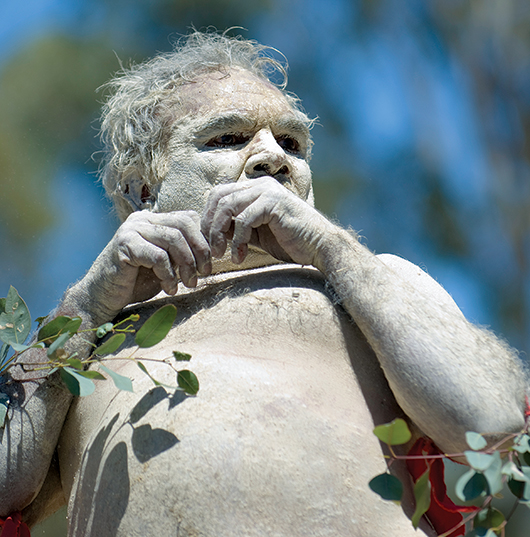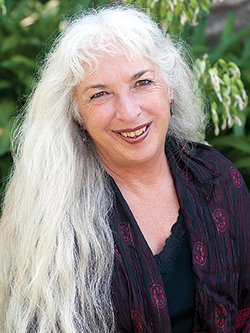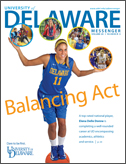
A voice for endangered species and cultures
ALUMNI | Deborah Bird Rose, AS73, is a professor in the Centre for Research on Social Inclusion at Macquarie University in Sydney. Her work, which focuses on entwined social and ecological justice, is based on her long-term research with Aboriginal people in Australia.

Rose writes across several disciplines, including anthropology, history, philosophy, cultural studies and religious studies. She is the author of numerous books and essays, and she recently completed the book Wild Dog Dreaming, published by the University of Virginia Press. She earned her bachelor’s degree in anthropology at UD and master’s and doctoral degrees at Bryn Mawr College.
Here, she is interviewed by Diane Kukich, AS73, 84M, for the Messenger.
Q: Your title, “professor of social inclusion,” is interesting. Is that an evolving discipline being studied at other institutions as well?
Unfortunately, social inclusion is having a checkered career in the academic world. It is subject to shifting politics at the national level as well as in universities. The field arose in response to marginalization and exclusion, and has come to address the quality of social bonds in multicultural societies. The main question would be: How are social relations constituted in societies that include many newcomers whose languages, religions, histories and other matters press for new ways of imagining national identity and solidarity?
In a settler society such as Australia these questions also involve Indigenous people. They were here long before colonization, and they have suffered through a terrible era of genocidal assimilation, so the question is not so much about inclusion but rather about resisting the assimilationist programs of colonization.
My work in decolonization is one of the areas of expertise that I bring to the study of social inclusion, but I’m also committed to expanding the very concept of the social to include nonhuman animals and other living beings with whom our human lives are deeply entangled.
Q: You have written several books. Where does Wild Dog Dreaming go that your previous books didn’t? Is this a book that the general public could understand and benefit from, or is strictly academic?
Wild Dog Dreaming: Love and Extinction was motivated by my concern about the disastrous mass extinction event now taking place. This is truly a “man-made mass death” being carried out against the nonhuman world. In the face of all this death, I felt compelled to address questions of how to respond, how to bear witness, how to call attention to the magnitude of the suffering and how to bring home the simple message that the Earth is not ours to destroy.
The book drew on my long-term research with Australian Aboriginal people, and my aim was to bring some of my great teachers into the conversation about the future of life on Earth. I wanted them to be participants in the conversation, not objects of analysis. I tried very hard to keep the book from becoming too academic because these are issues that affect everybody.
Q: Can you describe what you mean by the term “double death”?
I developed the term “double death” to address what it is about mass death that makes it different from “normal” processes of death. After all, death is an integral part of life. It isn’t an enemy, and it isn’t morally wrong. But something about mass death is terribly wrong. Double death addresses the amplification of death in which not only individuals but whole groups or species or ways of life are being eradicated. Double death involves the death of future continuities.
It is applicable across many scales, helping us to think, for example, about biodiversity losses that become so great that damaged ecosystems are unable to recuperate their resilience, and about extinctions now happening so rapidly that evolution is unable to keep up. We humans are the drivers of double death; it is also a mirror that reveals the depths of the wounds we are inflicting on life itself.
Q: As an undergrad at UD, did you have any idea of the direction your career would take?
I had a wonderful education in anthropology at the University of Delaware, so I was well-prepared for whatever twists and turns life might offer me. My [graduate] studies at Bryn Mawr built on that great start. But no, I had no idea of the directions my career would take.
It has been very important to me to be actively involved in matters of justice. I worked on many Aboriginal claims to land here in Australia, and I’ve been in court on Aboriginal people’s behalf, giving evidence as an expert witness. My work in extinction studies continues this commitment to justice. My Aboriginal teachers enabled me to understand that in a world of multispecies kinship (whether totemic or Darwinian), ethics never stops with the human.
Q: Environmental humanities is an area of growing interest at UD. Do you expect to collaborate with anyone here in this area?
I am totally delighted that UD is developing an Environmental Humanities Program. I have just taken up a position as visiting professorial fellow at the University of New South Wales, where I will be helping to get their new Environmental Humanities Program up and running. I am also a founding co-editor, with my research colleague Thom van Dooren, of the new journal Environmental Humanities. I hope there will be future collaborations.
Q: Do you see any hope for turning the tide of humans’ negative ecological influence?
It seems that the big opportunities for turning the climate change tide have already passed. On the matter of extinctions, there is a lot that could be done. One of the biggest issues is habitat destruction; we humans are not doing a good job at all of co-existing with our fellow creatures. Clearly, our survival, too, depends on making big changes in the way we think and act. As Western people, the burden falls especially upon us.






